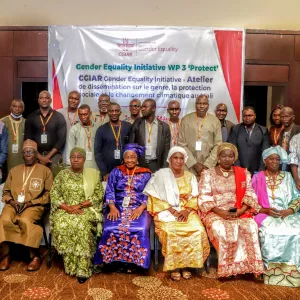Workshop: Exploring how social protection programs interact with women's capabilities to strengthen climate resilience in Mali
By, Olajumoke Adeyeye, Melissa Hidrobo, Shalini Roy Climate change is exacerbating gender inequalities globally, and large-scale solutions are needed. There is growing interest in the potential of social protection. Social protection programs – such as cash transfers or food transfers targeted to poor rural households, often with bundled components such as trainings – are already implemented at large-scale in countries

Workshop: Exploring how social protection programs interact with women's capabilities to strengthen climate resilience in Mali
By, Olajumoke Adeyeye, Melissa Hidrobo, Shalini Roy
Climate change is exacerbating gender inequalities globally, and large-scale solutions are needed. There is growing interest in the potential of social protection. Social protection programs – such as cash transfers or food transfers targeted to poor rural households, often with bundled components such as trainings – are already implemented at large-scale in countries around the world. While these programs have been shown very effective for reducing poverty and improving household food security, stakeholders increasingly seek to understand how this programming can also be leveraged to boost gender equality and climate resilience.
As part of the CGIAR Initiative on Gender Equality (HER+), researchers work with partners to generate evidence on what works and provide recommendations on effective designs for future social protection programs. This portfolio of work, “Gender-responsive social protection for climate resilience and equality” works primarily in Mali, Ethiopia, Bangladesh, and India. In Mali, the team has conducted a series of quantitative and qualitative studies on social protection, climate change, and gender, as well as a narrative study exploring links between social protection, gender, and climate resilience in the Sahel.
To communicate research findings to critical stakeholders, HER+ in collaboration with Institut d’Economie Rurale (IER) and the Programme de Filets Sociaux Jigisemejiri, conducted a dissemination workshop in Bamako, Mali on November 6th, entitled “Exploring how social protection programs interact with women’s capabilities to strengthen climate resilience in Mali.” Participants included stakeholders working at different levels on issues related to social protection, gender, and climate resilience in Mali or the Sahel region, across representatives of government, national and international NGOs, and donor agencies. The workshop’s key objectives were to provide deeper insights into the current situation around social protection, climate change, and gender equality in Mali, as well to provide a better understanding of how social protection systems can be better leveraged to boost the climate resilience of rural women and increase gender equality.
Welcome remarks were delivered by the Director, IITA Sahel Hub, Dr. Tahirou Abdoulaye, who highlighted the importance of gender in research on agrifood systems. He emphasized the roles that CGIAR centres like IITA, IFPRI, and ICRISAT are playing in promoting gender-responsive research. The Minister of Agriculture represented by the Ministry’s Gender Coordinator, Madame Fatoumata Coulibaly, presented the opening remarks. She highlighted the importance of the dissemination event, pointing out that the results would be very important for implementation of future social protection programs in Mali.
Monsieur El Bachir Doucoure and Monsieur Koulou Fane represented the Jigisemejiri team. They attested to the Malian government recognition of the importance of social protection programs in improving the livelihoods of men and women. They highlighted the efforts of the Malian government in implementing the ongoing social protection program, Project for the Development of Arid and Semi-Arid Zones of Mali (PDAZAM).
The HER+ team made four presentations. Dr. Melissa Hidrobo from IFPRI presented “Leveraging social protection for gender equality and climate resilience.” Dr. Hidrobo highlighted that social protection can support women’s and girls’ climate resilience by promoting women’s coping and adaptation. While some social protection designs are promising, it is important to make designs more intentionally gender- and climate-responsive for the local context.
Next, Dr. Eric Sessou from IOM presented on “Jigisemejiri case study: The role of Jigisemejiri in improving individual and household resilience,” showing that Jigisemejiri improved the adaptive capacity of households, women, and men. Dr. Cheikh Modou Noreyni Fall from Universite Cheikh Anta Diop De Dakar spoke about “Rainy Day Funds? How Men and Women Adapt to Heavy Rainfall Shocks and the Role of Cash Transfers in Mali,” showing that Jigisemejiri protected households during heavy rains. Both presentations concluded that although Jigisemejiri improved households’ adaptive capacity and coping responses, more intentional design around gender and climate could potentially support more transformative responses.
Dr. Jumoke Adeyeye of IITA and Monsieur Siaka Traore, IER, co-presented the findings of the study “Exploring how Social Protection Programs Interact with Women’s Capacities to Build Climate Resilience in Mali.” They found out that while Jigisemejiri contributed in some ways to improving gender and climate resilience outcomes, more gender-transformative strategies are required to address biased gender norms which constitute the structural drivers of inequality that reinforce gender and age-based household hierarchies.
Through a series of group discussions to validate the relevance of the findings and consider their relevance for participants’ day-to-day work and future decisionmaking, several reflections emerged. One participant said, “I have learned more today that social protection is very important for women, especially those in the rural areas.” Another said, “It is therefore necessary to empower women more in the decision-making process and to strengthen their capacities to undertake and manage income-generating activities.”
HER+ researchers greatly appreciated the energetic and thoughtful engagement from workshop participants and took back key insights to integrate into their research. The workshop was a valuable opportunity for researchers and stakeholders to listen to each other and learn from each other. Together, they will continue on the journey toward better leveraging social protection in Mali to boost the climate resilience of rural women and increase gender equality.

